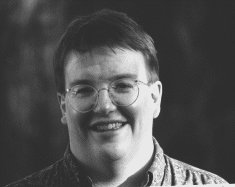Conspiracy-related films
We obviously have a lot of movie-lovers in the crowd this year, myself included. I noticed driving home that the Missouri Theatre is showing the 1950s "Invasion of the Body Snatchers" a week from Sunday (Sept. 18). I often show bits of this one in class. It's one of the original my friends and neighbors and loved ones are being replaced by emotionless pod people stories, and can be seen as allegory to Communist subversion, 1950s suburban conformity or both. Long story short: if you haven't seen this film and you are in this class, go see this film.
In other movie news, today's New York Times has a great review of a new exorcism film, The Exorcism of Emily Rose. Reviewer A.O. Scott actually pans the movie as religious propaganda, but argues that it's also indicative of the anti-scientific intellectual trends that we have discussed in class. These trends undergird "intelligent design" and other conservative attacks on science, as well as conspiracy theory and religion per se. In
"Dancing With the Devil, Then With a Prosecutor", Scott describes the rhetorical/intellectual judo through which a conservative, literal-minded Christian outlook (demons are real beings who move among us) gets to pose as "open-minded." I put one of his key phrases in bold :
"The movie pretends to take the same tolerant, anything's-possible position. While not especially good - judged strictly on its cinematic merits, it ranges from O.K. to god-awful - it is still a fascinating cultural document in the age of intelligent design. Its point of view suggests an improbable alliance of postmodern relativism and absolute religious faith against the supposed tyranny of scientific empiricism, which is depicted as narrow and dogmatic.
"The sincerity of a believer - Father Moore, in this case - is conflated with the plausibility of his beliefs. The doctors, meanwhile, seem so sure of themselves. But of course, the movie says, no one can ever be completely sure, and thus superstition becomes a matter of reasonable doubt. Meanwhile the clocks stop, the wind howls, and we are encouraged to believe - or at least not to disbelieve - our own eyes. Father Moore knows what he saw. So do I: propaganda disguised as entertainment."
Unfortunately, as we have discussed, there is really nothing improbable about an "alliance of postmodern relativism and absolute religious faith" (or other supernatural/paranormal beliefs, or conspiracy theories. The former opens the way for the latter, and practically encourages the adoption of supernatural or conspiratorial beliefs in the face of modern technological society.
In other movie news, today's New York Times has a great review of a new exorcism film, The Exorcism of Emily Rose. Reviewer A.O. Scott actually pans the movie as religious propaganda, but argues that it's also indicative of the anti-scientific intellectual trends that we have discussed in class. These trends undergird "intelligent design" and other conservative attacks on science, as well as conspiracy theory and religion per se. In
"Dancing With the Devil, Then With a Prosecutor", Scott describes the rhetorical/intellectual judo through which a conservative, literal-minded Christian outlook (demons are real beings who move among us) gets to pose as "open-minded." I put one of his key phrases in bold :
"The movie pretends to take the same tolerant, anything's-possible position. While not especially good - judged strictly on its cinematic merits, it ranges from O.K. to god-awful - it is still a fascinating cultural document in the age of intelligent design. Its point of view suggests an improbable alliance of postmodern relativism and absolute religious faith against the supposed tyranny of scientific empiricism, which is depicted as narrow and dogmatic.
"The sincerity of a believer - Father Moore, in this case - is conflated with the plausibility of his beliefs. The doctors, meanwhile, seem so sure of themselves. But of course, the movie says, no one can ever be completely sure, and thus superstition becomes a matter of reasonable doubt. Meanwhile the clocks stop, the wind howls, and we are encouraged to believe - or at least not to disbelieve - our own eyes. Father Moore knows what he saw. So do I: propaganda disguised as entertainment."
Unfortunately, as we have discussed, there is really nothing improbable about an "alliance of postmodern relativism and absolute religious faith" (or other supernatural/paranormal beliefs, or conspiracy theories. The former opens the way for the latter, and practically encourages the adoption of supernatural or conspiratorial beliefs in the face of modern technological society.


<< Home